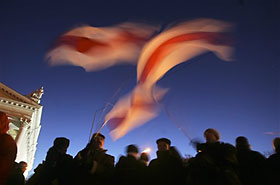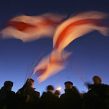
BELARUS: END GAME
Publication: Eurasia Daily Monitor Volume: 3 Issue: 58
By:

Five days after the presidential election of March 19, protesters continued a vigil on October Square. The authorities arrested more than 250 people between March 20 and 22, and administered beatings to many others, and in the early hours of March 24, hundreds of riot police stormed the camp site. How significant was the protest and what conclusions can be drawn from the authorities’ actions?
There were some similarities between the “Denim” or “Jeans” protest in central Minsk and those in other republics, most notably Ukraine in late 2004. There is a strong youth element, music, numerous tents (there were declared to be over 30), and a defiant refusal to leave the square despite adverse weather conditions, a lack of sanitary facilities, and other handicaps.
However, there were also some critical differences. Though the numbers are unprecedented for Belarus under Lukashenka, they do not match those in Kyiv, even allowing for the smaller population in the northern republic. Between 10,000 and 15,000 gathered on March 19. Subsequently, the numbers dwindled to 2,000-5,000, and fell away during the nights to a few hundred or less.
The position of the Belarusian opposition is significantly weaker than that in Ukraine. There was no claim to have won the election. Rather, the unified democratic candidate, Alexander Milinkevich, made two statements: first, that the election results were fabricated because Lukashenka did not win 82.4% of the vote. Milinkevich has stated that “various sources” indicate his total was 31% and that of Lukashenka 42%. It is difficult to discern how such figures were ascertained, as all the major polling agencies found it too problematic to conduct polls in the oppressive atmosphere of the election. Second, Milinkevich maintains that there should be a rerun of the election without Lukashenka’s participation. This demand complements that of his detained ally, Anatol Lyabedzka, who appealed to the Constitutional Court on these same grounds, i.e. that the president should not be allowed to run for a third term, and that the 2004 referendum was neither democratic nor legal.
In addition, Milinkevich hopes to use the March 25 commemoration of the short-lived independent state of 1918 for a final mass demonstration. In this regard he elected, together with his supporters, to remain on the square, to the chagrin of the other opposition candidate, Alexander Kazulin, who claims that Milinkevich reneged on an agreement to end the protests. Milinkevich in turn stated that he was not leading the demonstration but was rather a participant and that the protesters had opted to stay. It was a risky position in that he is unequivocally the opposition leader, around which those who support regime change in Belarus have united.
Until Friday morning, the government alternated between restraint and brutality. Troublesome opponents were detained and jailed for short periods. The editor of Nasha Niva newspaper, for example, Andrey Dynko, received a 10-day sentence for the usual transgression: “petty hooliganism.” Dozens of activists have suffered under the same law, including the leader of the Popular Front, Vintsuk Vyachorka. The deputy leader of Milinkevich’s staff, Viktar Korniyenka, was beaten up outside his apartment building by two assailants and is reportedly in serious condition in hospital. The viciousness and the all-out assault on the demonstrators have been carefully concealed from the public eye.
Lidziya Yarmoshyna, chair of the Central Election Commission, has declared that the election was “absolutely brilliant.” Allegedly, Lukashenka received 5,501,249 out of 6,630,653 votes cast (83%). The inauguration ceremony marking Lukashenka’s third term is to take place on March 31. That date, one assumes, necessitated the clearance of the square, separated only by a small park from the president’s residence.
Though the opposition is much weaker than its Orange counterpart in Ukraine, there are signs nevertheless that the Lukashenka regime faced a dilemma. Its opponents were denounced in the most derisory fashion, but thousands of citizens of the capital have witnessed a sustained protest, the likes of which has never been seen hitherto in Lukashenka’s Minsk. Russia has accepted the victory of Lukashenka, but has remained notably restrained over the past few days.
The president finally lost patience. Several hundred protestors were reportedly arrested and many were savagely beaten in custody. Yet more “commemorations” could be forthcoming, such as April 2, a date when the opposition usually denounces the Russia-Belarus Union, and the Chernobyl anniversary (the 20th), traditionally the biggest protest march, on April 26. Lukashenka would prefer that international attention be refocused elsewhere and seems perplexed by the sustained international interest. He could not have ordered a new election under the terms demanded by Milinkevich.
Overall, Lukashenka has been tested. He has attained a pyrrhic victory, but faces new uncertainties and doubts. The opposition is not yet powerful enough to remove him, but its threat has grown. The contrived turnout and vote count, as well as the over-reaction to the opposition campaigns, were in retrospect a blunder by the authorities that served to revive a long dormant civic society in Belarus. The end game — a massive assault on the small group that chose to stay for a further night on the square — was predictable. Additional retributions may follow The Jeans Revolution might have failed, but it marks the first sustained attempt by the opposition to resist the Lukashenka dictatorship.
(Charter 97, March 23, 24; Associated Press, March 23; Belapan, March 22; BBC Monitoring, March 21, 22; Sovetskaya Belorussiya, March 24; Agence France-Presse, March 24)




